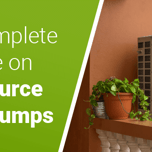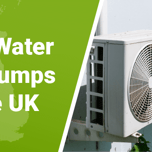Answer these simple questions and we will find you the BEST prices
Which type of solar quotes do you need?
It only takes 30 seconds
100% free with no obligation

Get up to 4 quotes by filling in only 1 quick form

Install a heat pump for less with the BUS grant

We’ve helped over 500,000 homeowners reduce their carbon footprint
- GreenMatch
- Heat Pumps
Complete Guide to Heat Pumps in the UK (October 2025)

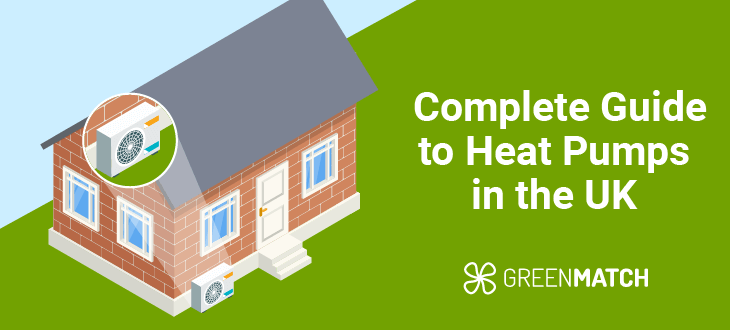
- A heat pump transfers thermal energy between spaces using a refrigerant. To heat, it extracts warmth from the outside and releases it inside; to cool, it removes warmth from the inside and releases it outside.
- Heat pumps efficiently convert energy into heat and cooling when compared to inefficient old boilers, reducing carbon emissions.
- The UK's Boiler Upgrade Scheme allows you to get up to £7,500 off heat pump installations when replacing a gas or oil boiler.
- By replacing your old, inefficient boiler with a heat pump, you can save up to £290 annually on your energy bills.
Heat pumps are heating and cooling systems that can save you up to £290 on your annual energy bills. Interested in reaping these financial benefits? Then, stick around to find out what kind of heat pumps there are, how they work, how much they cost, and the kind of savings you can expect from a heat pump system installation.
Let’s take a quick look at some of the questions you may have about heat pumps.
A heat pump is an energy system that provides heating by extracting naturally occurring heat from outside and transferring it into your home.
There are three main types of heat pumps: air source heat pumps (ASHP), ground source heat pumps (GSHP), and water source heat pumps (WSHP).
Air source heat pumps, in turn, can be divided into two categories, namely air to air heat pumps and air to water heat pumps. Other types include heat pump water heaters.
An air source heat pump extracts heat from the outside air, a ground source heat pump absorbs warmth from the ground, and a water source heat pump extracts warmth from available natural water sources. All of them can also reverse the process for cooling purposes.
Currently, air source heat pumps are the most popular option in the UK because they are cost-effective and easy to install.
Installing an air source heat pump costs between £2,600 – £22,780 and £6,700 – £40,500 for a ground source heat pump. It’s important to note that for GSHPs, the installation costs will be lower for horizontal groundwork and higher for vertical groundwork due to the difference in complexity, time and labour costs.
Below you can find an overview of how much heat pumps cost for different house sizes in the UK today:
| Estimated Heat Pump Costs | |||
|---|---|---|---|
| House size | Heat pump output | Air source heat pump | Ground source heat pump |
| 1-2 bedrooms | 3kW – 8kW | £4,000 – £8,500 | £11,500 – £14,500 |
| 3-4 bedrooms | 4kW – 16kW | £7,000 – £13,500 | £15,500 – £26,500 |
| 5-6 bedrooms | 8kW – 16kW | £9,500 – £16,500 | £21,500 – £29,000 |
One of the main benefits of installing a heat pump is that it offers savings on your yearly energy bills. Below is an overview of how much you can save with a heat pump system:
| Heat Pump Savings | ||
|---|---|---|
| Type of heat pump | Estimated annual savings* | Break-even point |
| Air source | Up to £1,200 | 6 – 11 years |
| Ground source | Up to £2,000 | 11 – 19 years |
It’s important to note that savings figures vary significantly based on the type of energy system you’re replacing with a heat pump. As a result, exactly how much you will save depends on your situation.
If you have a 2 – 3 bedroom house and reach the savings figures listed above, you can break even on your investment in an ASHP in 6 – 11 years, and 11 – 19 years for a GSHP installation.
Let’s take a look at the advantages and disadvantages of heat pumps in detail, to help you make an informed decision and a wise investment towards this low carbon heating system.
Advantages of heat pumps
Heat pumps can be a fantastic choice for your home in many ways. Below are some of the main advantages of installing one.
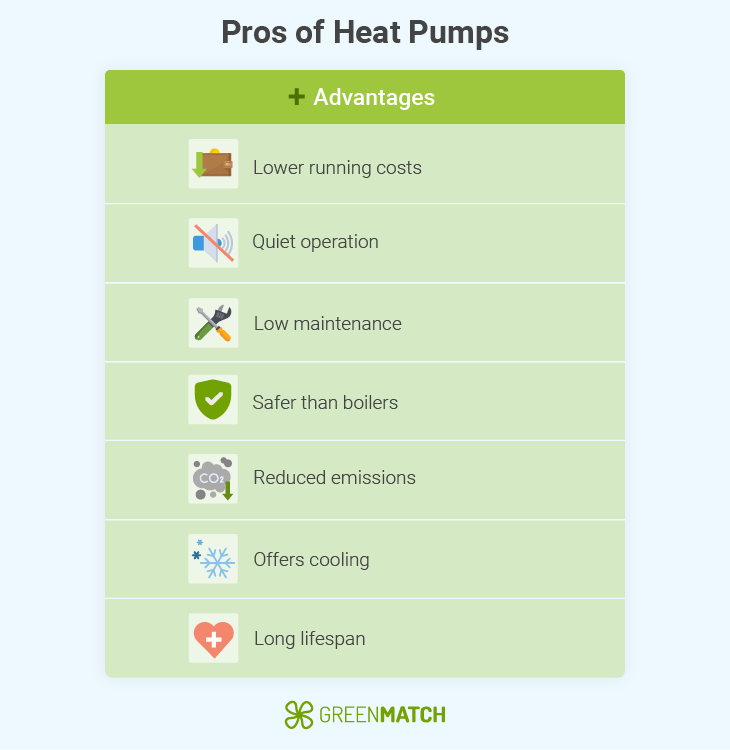
- Cost-effective operation:
Heat pumps are more budget-friendly than fossil fuel-based boiler systems, offering potential annual savings of up to £2,000. - Quiet operation:
Heat pump noise can be a concern, however, the latest technology now means they produce very low noise levels when they operate. Many heat pump manufacturers are prioritising quiet operation in their models which produce only 42 to 55 dB (similar to a quiet fridge or normal conversation volume). - Low maintenance:
Heat pumps require minimal maintenance. They are typically checked annually by the homeowner, and professional inspections are only necessary every 3 to 5 years. - Enhanced safety:
Heat pumps are considered safer than gas boilers as they don’t rely on burning fuel for heat production. This also eliminates the risk of carbon monoxide poisoning. - Reduced carbon footprint:
Heat pumps efficiently convert energy into heat, significantly lowering carbon emissions. Some models can 300 – 400% efficiency. - Cooling capability:
Some heat pumps can switch to cooling mode during hot weather, functioning as air conditioning units – particularly air to air heat pumps. - Lifespan:
Heat pumps have a lifespan of approximately 15-20 years, offering reliable, long-term heating solutions.
Disadvantages of heat pumps
Heat pumps are one of the most efficient home heating solutions available. However, there are some drawbacks to consider when choosing whether one is right for your home.
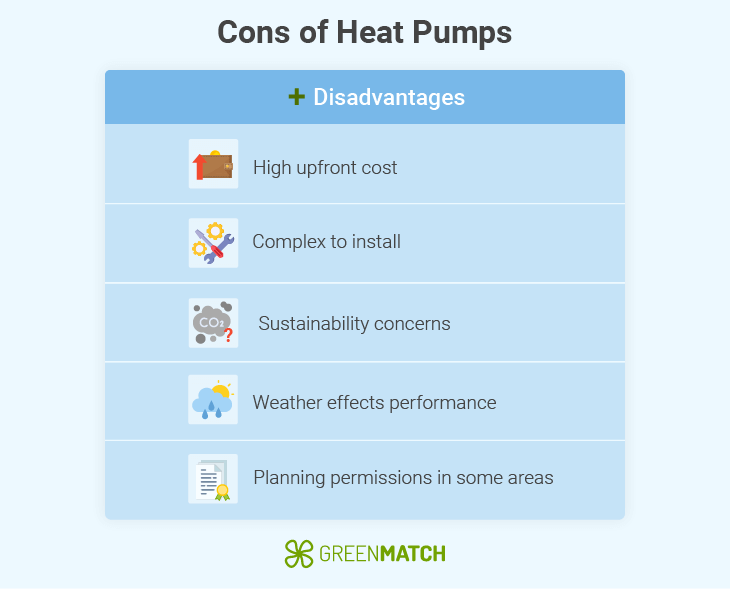
- Costly upfront investment:
Despite long-term energy bill savings, the initial investment of a heat pump can range from £2,600 – £40,500, which can be a significant barrier. - Complex installation:
Preparing and fitting a heat pump can include digging trenches, replumbing pipes or rewriting electrics. The more complex the work, the more disruption you may encounter and the more time it can take (which may mean additional costs). - Environmental concerns:
Due to their electricity power supply, heat pumps aren’t entirely carbon-neutral. Some brands also use fluids for heat transfer, which raises environmental concerns. To keep your heat pump eco-friendly, consider pairing it with solar power and choosing brands which use environmentally safe fluids. - Weather-driven reduced efficiency:
Cold weather may reduce the efficiency and increase the electricity usage for air source heat pumps. Ground source heat pumps, on the other hand, aren’t significantly affected by cold weather. - Mandatory planning permissions:
Special planning permissions are necessary for heat pumps in Wales and Northern Ireland, with England and Scotland requirements contingent on property size and location.
If you have more questions about heat pumps or their potential savings for your property, then you’ll want to consult a reliable installer who can offer you tailored advice.
Finding a reputed heat pump installer near you on your own can be time-consuming and frustrating. Instead of spending hours on tedious research, let us put you in touch with up to 4 local heat pump installers vetted by us. All you have to do is fill in our 30-second form to receive free and non-binding heat pump quotes from each installer. You can then directly compare them and choose the best one.
Click below to get started today!
- Quotes from local engineers
- Payment by finance available
- Save £7,500 with BUS grant
It only takes 30 seconds



What is a heat pump?
Heat pumps are versatile climate control systems that move heat instead of generating it. They extract heat from natural sources, such as ambient outdoor air (air source), warmth underground (ground source) or beneath water bodies (water source).
Each type of heat pump absorbs this naturally occurring heat, amplifies it through compression technology and transfers it to your home. This process can also be reversed, to extract heat from your home and make it cooler during the summer months.
Heat pumps can be a great alternative to fossil-fuelled heating systems, such as gas or oil boilers. Air to water heat pumps, for example, can provide central heating and hot water and become a direct replacement for your boiler. This is a good option for those wishing to reduce reliance on fossil fuels and lower their emissions.
How does a heat pump work?
Heat pumps work by transferring heat from a natural outdoor source into the home. There are several parts to the process which help to increase the temperature and direct this to your central heating or hot water systems. Here’s how it works:
-
Absorption: A heat pump collects warmth from the outside (in the air, underground, or from a body of water). This can be extracted by a fan unit or using buried pipes. The heat is absorbed through pipework and transferred to a fluid called refrigerant.
-
Compression: As the refrigerant warms it turns into a gas vapour. To increase its temperature further, the vapours are passed through a compressor. This now very hot gas passes through a heat exchanger where it is condensed (usually inside the indoor unit).
-
Heating the home: At this point, the heat can now be transferred to heating systems - such as air ducts or water systems to heat radiators or hot water outlets.
-
Condensing: After the refrigerant passes through the heat exchanger it begins to cool, condensing back into a liquid state. It can then flow through an expansion valve, which further reduces its pressure and temperature.
- Cycling system: The liquid refrigerant will cycle back through the system to continue collecting heat from outdoors, where it begins the process again. Alternatively, the heat pump can reverse the process - taking warmth from the inside and releasing it outside.
Read a more in depth explanation in our how does a heat pump work? article.
Types of heat pumps
There are three main types of heat pumps: ground, air and water source. Each type absorbs heat from a different natural resource. Ground source heat pumps will use heat trapped deep within the earth; air source draws in ambient air from outside through a fan unit; and water source heat pumps take heat from beneath water bodies (such as rivers).
Read more about each type of heat pump by clicking the image links below:
An alternative to those above is a hybrid heat pump, which combines a heat pump and boiler. This system is designed to switch between both systems, depending on which is the most efficient at a given time. For example, if you require more heat than your heat pump can manage due to very cold temperatures, the boiler will act as a backup heating source.
Hybrid options are great for homes with very high heating demands or those living in colder climates. They can reduce energy consumption, carbon emissions, and ensure a consistent heating supply.
The average hybrid heating system costs between £10,250 to £18,550 fully installed, which includes both a heat pump and a new boiler.
Which is the right heat pump for you?
With so many heat pump options, you might be confused as to which is the most suitable choice for your home. To help you decide, we’ve designed a quick chart to help you navigate which options are open to you based on the space surrounding your home, whether your home is insulated, and how high your heating demand is.
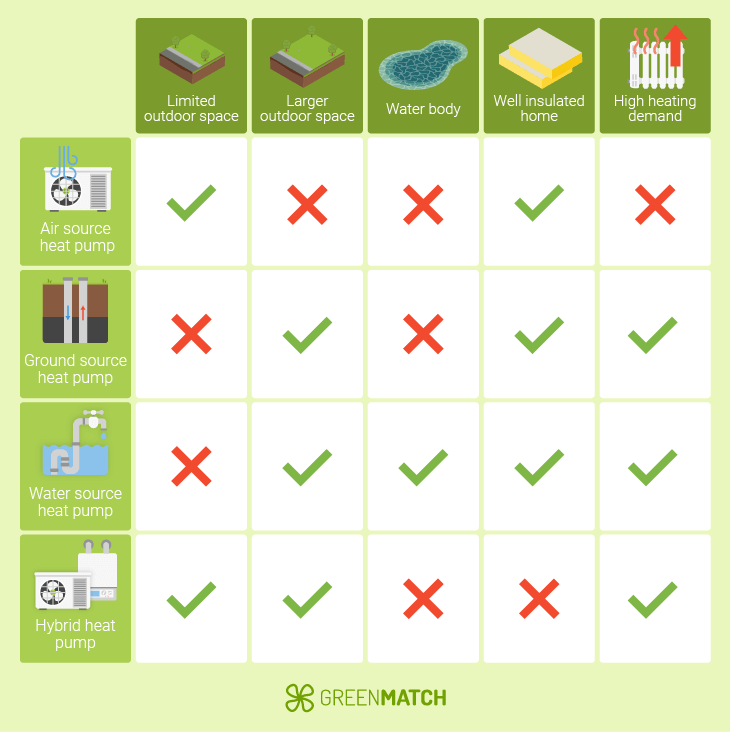
Ground source heat pumps generally demand larger outdoor areas, as they use underground pipe systems to absorb heat. This means digging large horizontal trenches to lay pipes, or drilling deep boreholes - both requiring a large area of land beside your home to do so.
Hybrid heat pumps offer you a choice of which heat pump type you choose to pair with a boiler, however, they’re generally best for homes that rely on a large, consistent heating supply.
Water source heat pumps are, of course, only a real option for a home next to a suitable water body. However, most other homes can benefit from an air source heat pump - you don’t need ample outdoor space or a particularly large heating demand. This is why air source options are the most popular. Find out more about the best air source heat pumps.
How much does a heat pump system cost?
A new heat pump can cost between £4,000 - £27,500, depending on the type you choose. The cost of a ground source heat pump tends to sit at the higher end of this range, especially when vertical drilling for boreholes is required. Installation and labour fees are often the largest factors influencing the final price.
Aside from the supply and installation, running costs are also important to consider. These can be affected by the size of your home, how well-insulated your property is and the efficiency of the heat pump model.
| Heat pump type | Estimated cost (including installation) | Average yearly running costs |
|---|---|---|
| Air to air | £4,000 - £9,500 | £950 - £2,280 |
| Air to water | £9,000 - £15,000 | £740 – £1,600 |
| Ground source | £11,500 - £27,500 | £625 – £1,250 |
Whilst our figures are based on the current market prices, these are only approximate. To get heat pump costs for your needs, it’s best to speak to qualified installers to compare quotes. This can be a long and tiring process though, spending hours on research and waiting days for a response.
Avoid wasting your spare time and use our simple, free service instead! When completing our 30-second form, we’ll get to work and connect you with up to 4 heat pump installers in your area. They can provide competitive quotes and ensure you get the best deal.
It’s free with no obligations. Just click below to get started.
- Quotes from local engineers
- Payment by finance available
- Save £7,500 with BUS grant
It only takes 30 seconds



Heat pump efficiency
Heat pumps are significantly more energy efficient than any other heating system. They offer up to four times as much heat production per unit of energy as traditional gas boilers.
This means you can save between £290 and £550 when replacing your old gas boiler for an air source or ground source heat pump.
Higher heat pump efficiency not only means annual savings but also a significant decrease in harmful emissions when compared to other heating systems. For example, a gas boiler may have an efficiency of 92%, meaning 8% of the fuel burned is lost as waste gases (causing emissions and increasing the amount of fuel you burn to reach desired temperatures).
Here’s how heat pumps compare to other heating systems:
| Heating system | Efficiency |
|---|---|
| Heat pump | 300 - 400% |
| Boiler | 92 - 100% |
| Electric heater | 100% |
Are heat pumps worth buying?
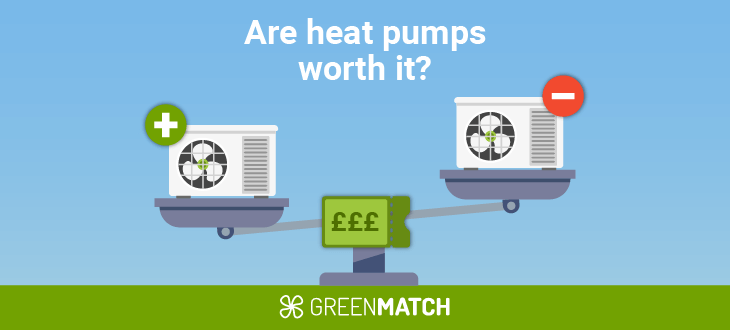
Heat pumps are a significant investment, but they do offer substantial annual savings long term. For example, if you replace an old gas boiler with an air source heat pump, you could save up to £290 per year on your energy bills.
In addition, government incentives like the Boiler Upgrade Scheme can reduce your upfront installation costs by £7,500 to help make those upfront figures less intimidating.
The table below shows the potential savings you could make when replacing an old, inefficient heating system (such as electric storage heaters) with a heat pump and the estimated point you can break even on your initial investment:
| Type of heat pump | Estimated annual savings* | Break-even point |
|---|---|---|
| Air source | Up to £1,200 | 6 - 11 years |
| Ground source | Up to £2,000 | 11 - 19 years |
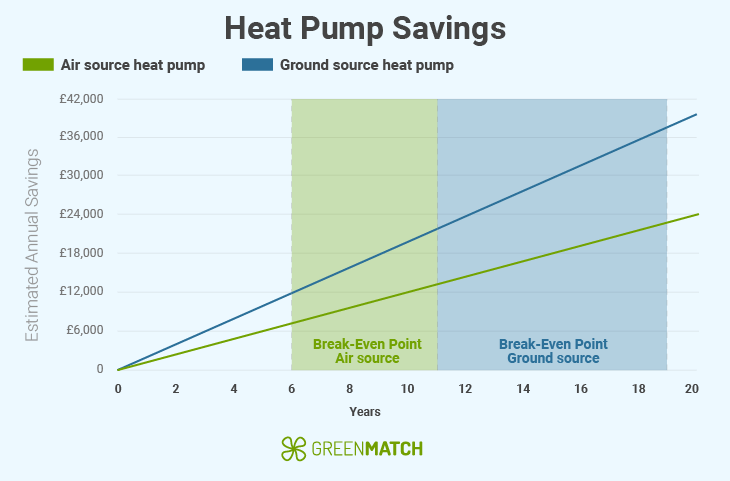
If you’re still wondering, are heat pumps worth it? Think about your own circumstances. Depending on your current situation, the repayment time can be drastically shorter than the lifespan, making it a worthy investment. Even though the consensus is that heat pumps are a good investment, this doesn’t mean that you should overpay on upfront costs.
To ensure you get the best deal when you replace a boiler with a heat pump, we recommend comparing multiple quotes from local installers. This can take up hours of your free time when done alone, though, with endless scrolling and form-filling. Instead, you can fill in our 30-second form, and we’ll connect you with up to 4 trusted, qualified installers. You’ll get free quotes to compare, with no obligations attached.
Click below to begin.
- Quotes from local engineers
- Payment by finance available
- Save £7,500 with BUS grant
It only takes 30 seconds



Heat pump grants
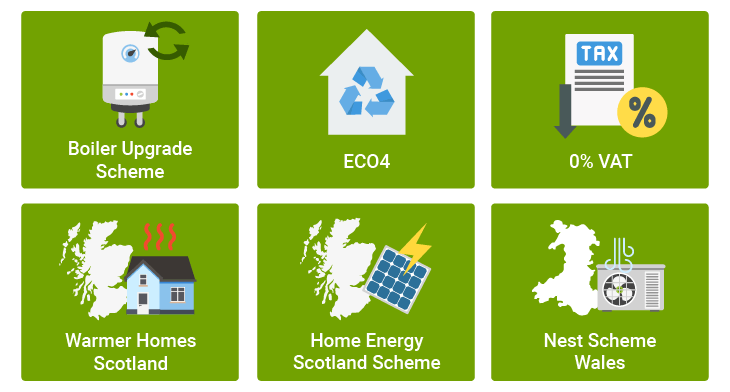
As you can see, heat pumps can be quite an investment. Thankfully, there are several heat pump grants in the UK that you could apply for to potentially lessen the financial burden of installing a heat pump.
These include: The Boiler Upgrade Scheme, the Energy Company Obligation (ECO4), Warmer Homes Scotland, the Home Energy Scotland Scheme, and the Nest Scheme in Wales. You can also benefit from 0% VAT when installing a heat pump.
Below is an overview of how much you can save on your heat pump installation with each of these grants:
| Heat pump grant | Savings | Region |
|---|---|---|
| Boiler Upgrade Scheme | £7,500 off upfront installation costs | England, Wales |
| The Energy Company Obligation (ECO4) | £7,000 – £20,000 | England, Scotland, Wales |
| Warmer Homes Scotland Scheme | Grant up to £10,000 | Scotland |
| Home Energy Scotland Scheme | Grant of up to £7,500, and an interest-free loan up to £7,500 | Scotland |
| Nest Scheme Wales | Potential full coverage of heat pump installation costs | Wales |
| 0% VAT | Savings of up to £2,450 on installation costs | UK |
Before starting the application process, make sure to check the eligibility criteria of each grant. Some are only open to those on low incomes, or living in homes that need energy efficiency upgrades. There may also be requirements to be on selected benefits or living in particular regions.
For example, homeowners choosing heat pumps in Scotland have three regional grants available. Whereas those living in Wales can apply for four, including the Nest Scheme.
Heat pump grants in Northern Ireland are slightly different from those in the rest of the UK. For this reason, we highly recommend checking our article on heat pumps in Northern Ireland.
Is a heat pump the right choice for you?
If you’re looking for a low-carbon heating alternative, that can reduce your annual energy bills then a heat pump is a really great option to consider. However, not all homes are suitable for all types of heat pump, and not all heat pumps may fit your own heating needs.
To help you decide if a heat pump is right for you, we’ve created a simple checklist below of all the important factors you should consider.
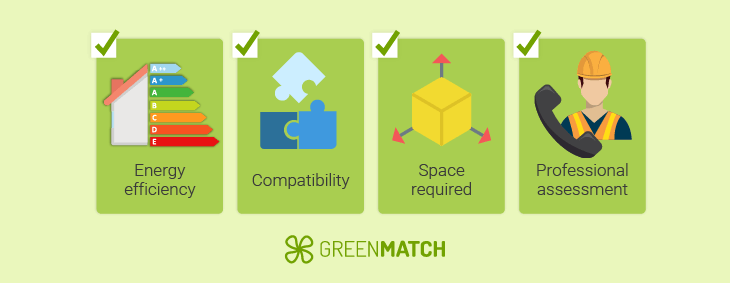
-
How energy efficient is your home?
Consider how well insulated your home is, do you have wall or loft insulation? Double glazed windows and doors? Or any significant draft issues?
Your home will benefit more greatly from a heat pump if it is well insulated. This will allow the system to work more efficiently as the heat generated will not be lost through walls or windows.
If you consider your home to be older, with poor efficiency, consider if this can be upgraded. Not only will this make a heat pump more effective, but it will improve the comfort of your home overall.
-
Is your existing heating system compatible?
Do you have underfloor heating or large radiators? Are you replacing an electric, oil or LPG system? Homes with underfloor heating are well suited to heat pumps as they can distribute heat at lower temperatures. If you have an existing low-temperature system, these can be easily adapted to heat pumps.
If you don’t have these existing elements, you may need to consider that radiator upgrades, or pipework changes will be needed as part of your replacement. It’s good to plan for these changes in advance. Alternatively, you could look into a high temperature heat pump which can offer a better solution for larger, or poorly insulated homes.
-
How much space do you have in your garden?
If you’re lucky enough to have a large area of land next to your property (up to 700m2), you may be able to consider more options - such as ground source heat pumps. If you have a small outdoor area or live in an apartment, an air source heat pump is much more suitable. They take up less space and can even be wall-mounted, making them great heat pumps for flats.
-
Time to consult a professional?
Whilst you can get a good indication as to whether a heat pump is right for your home by answering a few simple questions, there are some aspects that simply need a professional opinion.
MCS-certified installers can assess your property, your heating needs, insulation levels and more to complete a heat loss calculation for your home. They’ll be able to recommend the best heat pump option and give you guidance on how to get the most from the technology.
Finding a heat pump to suit your needs, that works best for your home and gives you the benefit of efficient, money-saving heating is an exciting prospect! But finding a trusted, qualified installer to help you can feel like an uphill struggle. Spending hours of your precious time requesting quotes and waiting days to hear back from anyone.
Luckily, you can avoid all that stress and disappointment by filling in our one simple form instead. In just 30 seconds, we’ll have all we need to connect you with up to 4 heat pump installers from your area. They can provide you with quotes to compare so you can get the very best deal.
It’s completely free, with no obligation attached. Click below to get started!
- Quotes from local engineers
- Payment by finance available
- Save £7,500 with BUS grant
It only takes 30 seconds



FAQ
The electricity consumption of a heat pump depends on several factors, including its size, efficiency, operating conditions, and the climate in which it is used. To get a precise estimate of how much electricity a specific heat pump will use, it’s best to consult a professional heat pump installer.
Yes, a heat pump works well in the UK climate. This is because of the moderate winters that rarely reach extremely low temperatures. This aspect is particularly important for air source heat pumps, which rely on warm outside air to warm up your home.
Yes, most heat pumps work with whatever type of radiator you have at home. If you have an air to water heat pump or a ground source heat pump, these can also work well with underfloor heating.
This is only necessary if you want to use the heat generated by your heat pump to supply your taps with hot water. Some heat pump models offer an integrated heating and hot water solution and come with built-in water storage tanks.
Heat pumps last between 15 – 20 years, depending on their usage and maintenance. Among the pros and cons of heat pumps, their lifespan is one reason they are popular, as they can be relied upon for many years.

Becky is an experienced SEO content writer specialising in sustainability and renewable trends. Her background in broadcast journalism inspires reliable content to help readers live more sustainably every day.

We strive to connect our customers with the right product and supplier. Would you like to be part of GreenMatch?

- Quotes from local engineers
- Payment by finance available
- Save £7,500 with BUS grant
It only takes 30 seconds







